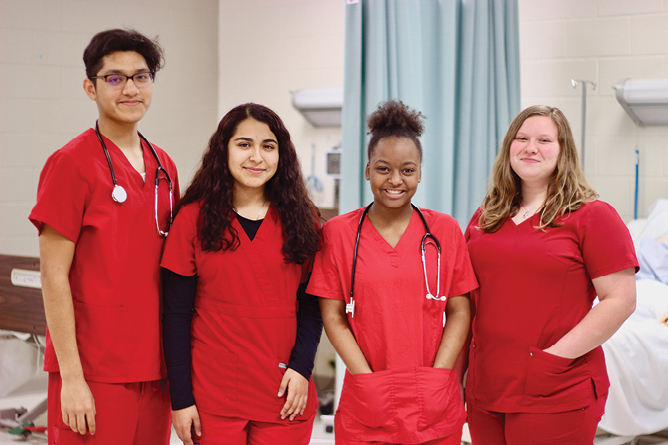A shift in education may be to be blame for America’s labor crisis.
Prior to the turn of the century, skills-training courses were prominent in American public schools. Wood shop, metal shop and autobody classes were a part of the standard high school curriculum. The availability of these courses slowly began to slip away following the passage of the No Child Left Behind Act in 2001.
Due to this legislation, school funding became reliant on meeting federal standards through mandated testing. Thus, K-12 education was restructured to center around preparing for annual math and reading assessments. With Career and Technical Education (CTE) courses not essential for this new curriculum, support for them dwindled and often, once budget cuts came rolling in, ceased entirely.
According to data from the National Center of Education Statistics, from 1990 to 2009, the average number of CTE credits earned by U.S. public high school graduates declined from 4.2% to 3.6%, while the average number of credits earned in subjects such as Math, English, Social Studies and Science increased.
As the nation now faces thousands of job openings in the industries these classes once prepared workers for, reintegrating and revamping CTE courses has risen to the top of the U.S. Department of Education’s agenda.
“Over the last two years, we graduated one of every five of our seniors with an industry-based certification that they are able to take directly into the workplace.”
— Luke Hurst, Director of Assessment and Accountability, Terrell Independent School District.
Launched at the end of 2022, Raise the Bar: Unlocking Career Success is a new initiative to increase and expand K-12 skills-based learning and training pathways across U.S. public schools. Backed by $120 billion, this program is working to ensure that current and future generations are developing the skills necessary to fill jobs in manufacturing, automotive, cybersecurity and emerging positions such as those created by the Bipartisan Infrastructure Law and CHIPS and Science Act.
President Biden’s proposed FY24 budget features various projects to bolster this initiative, including $43 million in CTE grants and $215 million for CTE national programs, $200 million of which will be used to support competitive grants for the Career-Connected High School Grant Program. Kicked off in August 2023, this program provides funding to a consortia of local K-12 educational agencies, higher ed institutions and employers to pilot evidence-based strategies that increase the integration and alignment of the last two years of high school and the first two years of postsecondary education.
These grants have the ability to support a variety of activities to address regional needs, including dual enrollment classes, covering the costs of tuition, books, supplies and other related expenses for low-income students, tutoring and additional academic supports, transportation for students to work-based learning sites, the development of new CTE programs in high-growth fields, teacher training and new equipment for these programs.
CTE Strengthens Communities
Located around 32 miles east of Dallas, Texas, the city of Terrell knows the benefit of having a robust CTE program within its community. The Terrell Independent School District (TISD) boasts 11 pathways that allow students to gain hands-on experience, college credits and certifications in high-demand and emerging industries before graduation. Animal Science, A/V Digital Communications, Business Management and Marketing, Advanced Manufacturing and Robotics, Welding, Automotive, Computer Science, Health Science and Legal Studies, are among the pathways currently offered.
“Several of those programs can actually start in the eighth grade,” says TISD’s Director of Assessment and Accountability Luke Hurst. “Over the last two years, we graduated one of every five of our seniors with an industry-based certification that they are able to take directly into the workplace. There are education pathways where there are already longstanding job openings in the community that are students are able to fill rather quickly.”
Madix Inc., FXI, Walmart Distribution and Oldcastle BuildingEnvelope are among the various businesses in the region benefiting from graduates of TISD’s CTE pathways program. Some of these employers also have played a role in bolstering these programs.
In addition to hiring graduates, Nucor Building Systems donates metal to the welding program, which, like many of the pathways, also includes dual-enrollment courses at nearby Trinity Valley Community College.
For the automotive pathway, the school district has partnered with the local Platinum Chevrolet dealership. With the help of that company’s technician, students are learning the tricks of the trade and completing industry-based certifications in suspension and steering.
“Typically, a young man, or woman for that matter, would start out on what I call a lube rack, doing basic oil changes, rotating tires, looking at filters and things like that. And if they want to stick with it, we encourage them to,” says Justin Rudd, general manager at the Platinum Chevrolet dealership in Terrell. “You start out on the lube rack, and we’ll work you into being a helper in the shop for one of the main technicians and then you slowly start going out on your own in the automotive world fixing cars. And that process does take years, but it starts with a young person in school.”
Building upon this success, the TISD has big plans to expand its repertoire of pathways in the coming years.
“We have applied for a grant that will allow us to open up an aviation pathway. We have the airport here in Terrell, and then, of course, the metroplex is a hub for aviation. So, it will allow students to get their certification in drone piloting and give them some exposure to aviation,” says Dr. Georgeanne Warnock, the superintendent of the TISD. “Down the road, as part of our law program, we are looking to expand that to law and criminal justice. We have a police force here in the district, and they are really excited that they’re going to be able to help teach some of the criminal justice classes and connect with students in a different way in the classroom. Then we’re looking to add a culinary arts program. Those are just some of the things that we have happening.”

